
Looking south from Penn Treaty Park (2007).
Benjamin Franklin Bridge, 1926
Vine Street across the Delaware River to Camden, New Jersey
© Helene Schenck & Michael
Parrington, Workshop of the World (Oliver Evans Press,
1990).
A bridge linking Philadelphia
and Camden, New Jersey was proposed as early as 1818.
This plan utilized Windmill Island, which was
located midway between the two cities until 1891-97 when
it was removed by the Federal Government to improve
navigation. A further design for a suspension bridge was
produced in 1831 by John C. Troutwine; and in 1868 yet
another design for a "double draw" suspension bridge was
proposed. None of these proposals came to anything,
and the first real move toward linking Philadelphia and
Camden occurred in 1919 with the formation of the
Delaware River Bridge Joint Commission. In 1920, a Board
of Engineers was formed and Dr. Paul P. Cret was
appointed as architect, assisted by Leon S. Moiseff,
Engineer of Design, and Clement E. Chase, Assistant
Engineer.
In 1921, an Act of the United States Congress authorizing
the bridge was passed and the Board of Engineers produced
an estimate for the construction cost of $28,871,000.
Work on the bridge commenced on January 6, 1922,
and the bridge was formally opened to traffic on July 1,
1926, on schedule. When completed, the almost two-mile
expanse was the longest suspension bridge in the world.
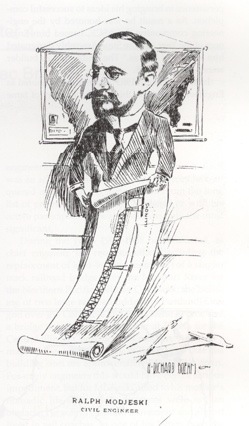
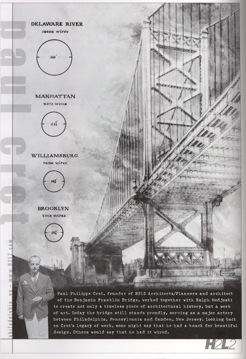
The total length of the bridge is 9,570 feet, and the
length of the main span is 1,750 feet. The towers soar
380 feet above the water level; clearance for shipping is
135 feet, and the deepest foundations extend 105 feet
below high water. The total weight of the bridge is
720,000 tons. The main piers contain 59,000 cubic yards
of masonry and concrete, and the anchorages 216,000 cubic
yards. Bethlehem Steel, American Bridge Company,
and the Keystone State Construction Company were among
the main contractors for the project. 1
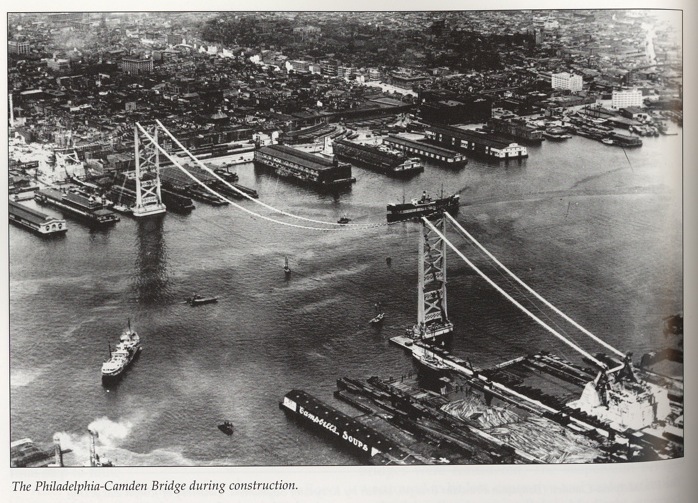
In its
over 60-year history, the bridge has seen many changes to
the Philadelphia and Camden skylines. The bridge itself
was adapted in the late 1960s to carry the tracks of the
PATCO high speed line, a commuter rail line running from
16th Street in Philadelphia to Lindenwold, New Jersey.
The bridge was completely redecked in 1988, ensuring its
survival for many years to come.
1 Delaware River Bridge
Joint Commission, The
Bridge over the Delaware River Connecting Philadelphia,
PA and Camden, NJ. Final Report of the Board of
Engineers submitted June 1, 1927, by Ralph Modjeski, George
S. Webster, and Laurence A. Ball.
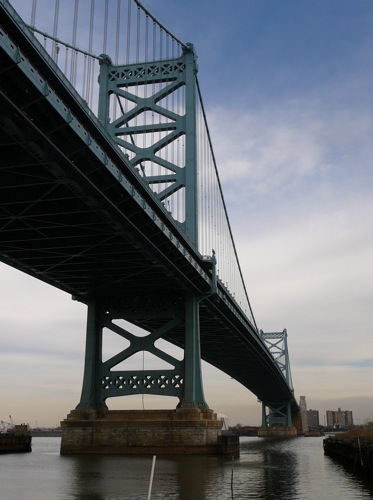
Update May
2007 (by
Harry Kyriakodis):
Still standing. The Delaware
River Port Authority celebrated the 75th anniversary of
the Benjamin Franklin Bridge by closing the span to all
but pedestrian traffic on July 1, 2001. Thousands of
people, some in 1920s attire, crossed the bridge. Antique
cars, trucks, and fire engines were displayed on the
deck, and two of the original rail cars that ran in the
1930s were on display at mid-span on the southern tracks.
Since then, the bridge has undergone an extensive
repainting process involving bead-blasting off many coats
of old paint to bare metal. Only the Philadelphia
approach remains to be done, but this has been delayed
for years due to a complicated political dispute between
Pennsylvania and New Jersey involving the dredging of the
Delaware River.
See
also:
Jósef Głomb,
A
Man Who Spanned Two Eras—The Story of Bridge
Engineer Ralph Modjeski (Philadelphia Chapter of the
Kosciusko Foundation, 2002), translated by Peter J. Obst.
Photographer James B. Abbott has produced marvelous
interior and exterior photos of the Ben Franklin
Bridge. Abbott's studio is in the shadow of the
bridge, in the former Wilbur Chocolate factory.
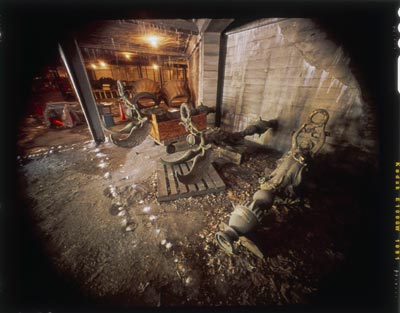
Winged
Victories in Bridge Plaza, 1998, Ilforchrome print,
20" x 24". © James B. Abbott
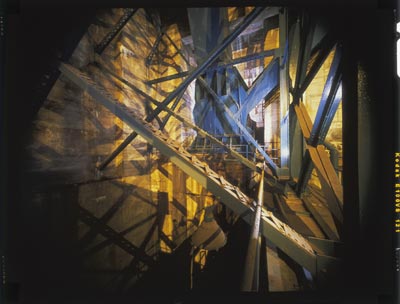
Anchorage
Bridge Cable Bend, 2000, Ilforchrome, 20" x
24". © James B. Abbott
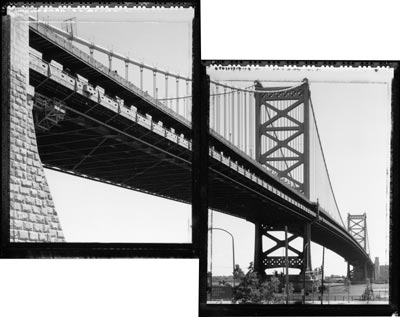
Untitled,
Ben Franklin Bridge from Water and Race
street, 2001, Iris print
mounted on museum board, 31" x 38". © James B.
Abbott